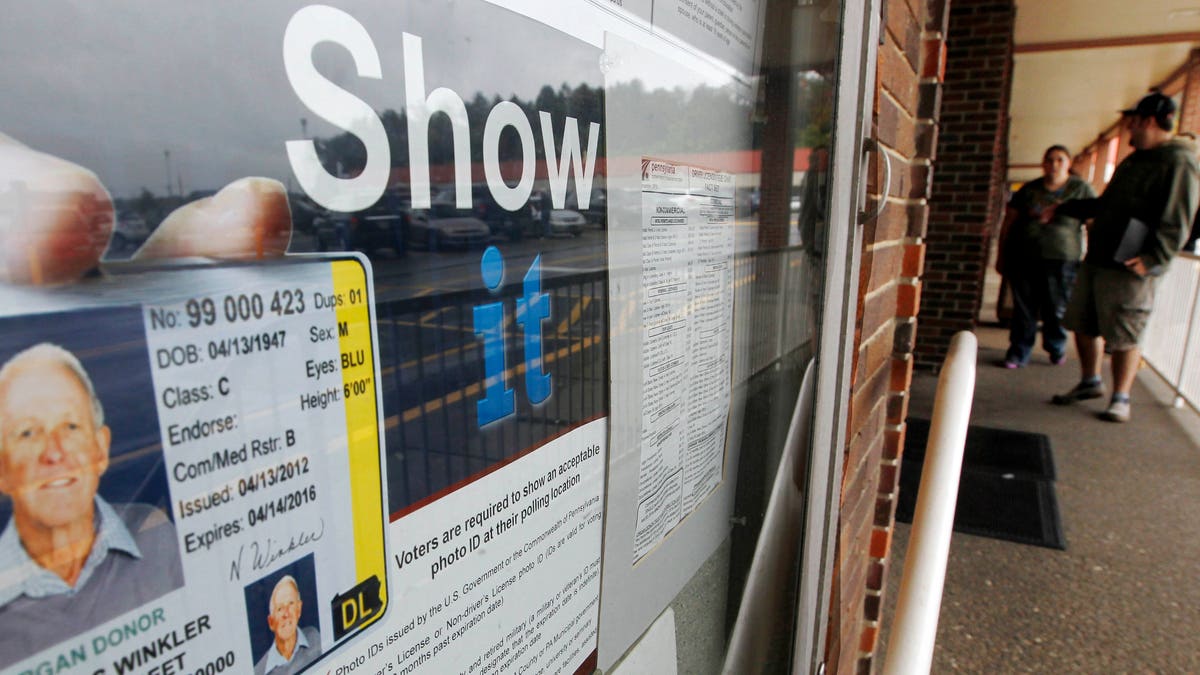
FILE - In this Sept. 26, 2012 file photo People pass the signs telling of the requirement for voters to show an acceptable photo ID to vote as they head into the the Penndot Drivers License Center in Butler, Pa. Some political momentum could be on the line in a judges forthcoming ruling on Pennsylvania's tough new voter identification law. Commonwealth Court Judge Robert Simpson is expected to rule Tuesday. Thats just five weeks before voters decide whether to re-elect President Barack Obama, a Democrat, or replace him with Mitt Romney, a Republican. (AP Photo/Keith Srakocic, File)
HARRISBURG – Pennsylvanians will not need a photo ID to cast a vote in the Nov. 6 presidential election.
Commonwealth Court Judge Robert Simpson postponed the state's tough new voter identification requirement, saying he was not convinced that it wouldn't keep some people from voting, as opponents argued.
"I'm still not convinced in my predictive judgment that there will be no voter disenfranchisement," Judge Simpson wrote.
The judge will allow the law to go into full effect next year.
Simpson was ordered by the state Supreme Court to make a decision no later than Tuesday.
Simpson based his decision on guidelines given to him days ago by the high court justices, and it could easily be the final word on the law just five weeks before the Nov. 6 election. An appeal is possible.
One lawyer for the plaintiffs said it appeared to be a "win."
His ruling came after listening to two days of testimony about the state's eleventh-hour efforts to make it easier to get a valid photo ID. He also heard about long lines and ill-informed clerks at driver's license centers and identification requirements that made it hard for some registered voters to get a state-issued photo ID.
The 6-month-old law — now among the nation's toughest — has sparked a divisive debate over voting rights and become a high-profile political issue in the contest between President Barack Obama, a Democrat, and Republican nominee Mitt Romney, for Pennsylvania's prized 20 electoral votes.
Democrats and groups including the AARP and NAACP had mounted a furious opposition to a law Republicans say is necessary to prevent election fraud. Critics have accused Republicans of using old-fashioned Jim Crow tactics to steal the White House and have highlighted stories of registered voters struggling to get a state photo ID.
The law was already a partisan lightning rod when a top Republican lawmaker boasted that it would allow GOP nominee Mitt Romney to beat Democratic President Barack Obama in Pennsylvania.
Up for grabs are Pennsylvania's valuable 20 electoral votes, the sixth most. For now, Republican candidates are trailing in polls on the state's top-of-the-ticket races.
In recent months, Republicans have sent out fundraising appeals highlighting legal challenges to the law or an inquiry into the law by Obama's Department of Justice, and the party no doubt would add a court defeat to its rallying cry.
The state's Republican Party chairman, Rob Gleason, insisted Monday that supporting the law is about good policy, not about motivating party voters. But then he criticized Democrats for opposing the law and for using it as an election issue.
Don Adams of the Philadelphia-area Independence Hall Tea Party Association said his membership of thousands is closely watching the issue.
"I think it'll drive our people even more, but I think they're already driven," Adams said. "I don't know how much more you can drive them."
Christopher Borick, a pollster and assistant professor of political science at Muhlenberg College in Allentown, said he would expect Republicans to use the law's defeat to warn of higher Democratic voter turnout and make it part of the case for why efforts to turn out Republican voters are essential.
Based on reporting by the Associated Press.
Follow us on twitter.com/foxnewslatino
Like us at facebook.com/foxnewslatino
